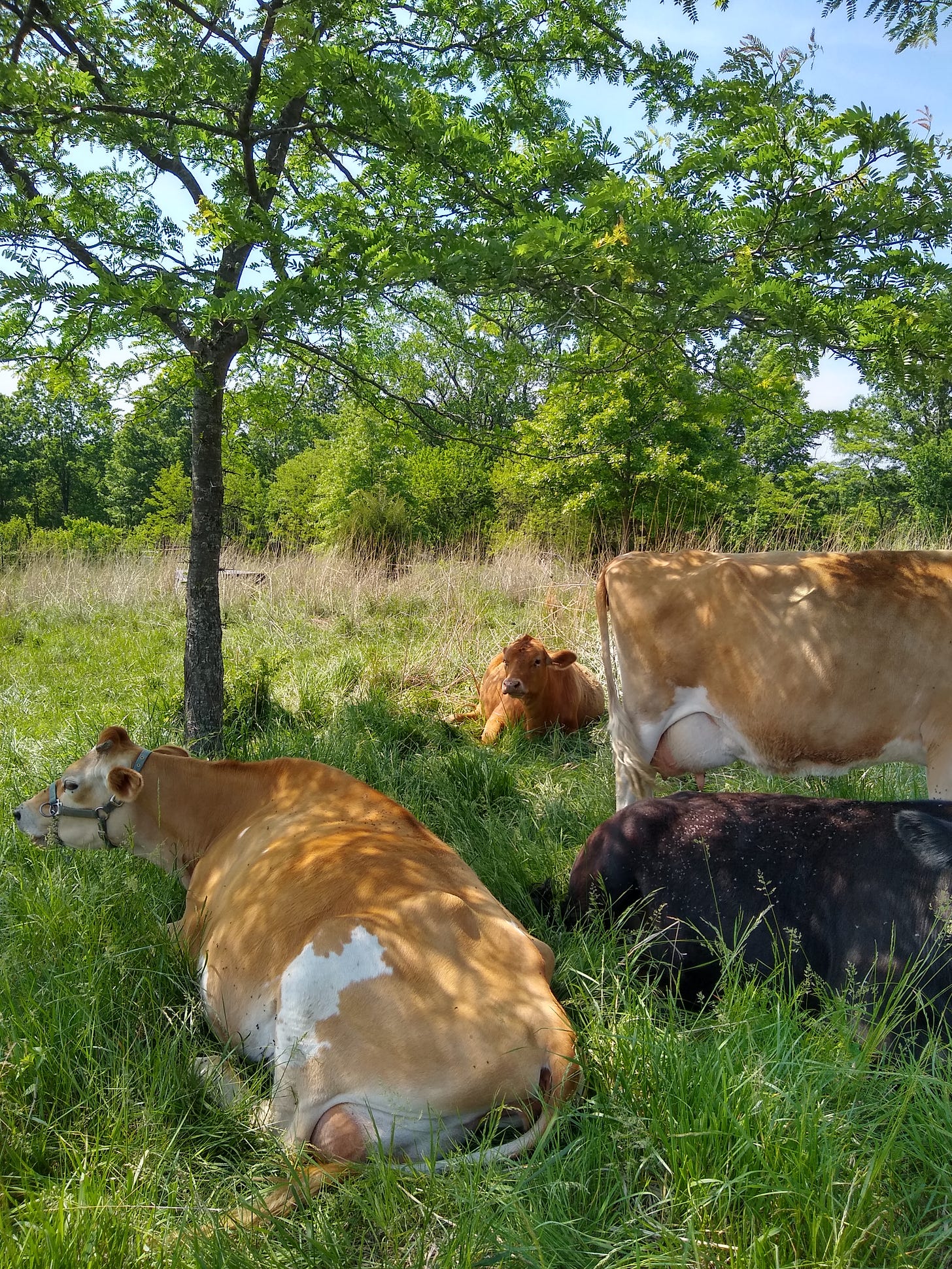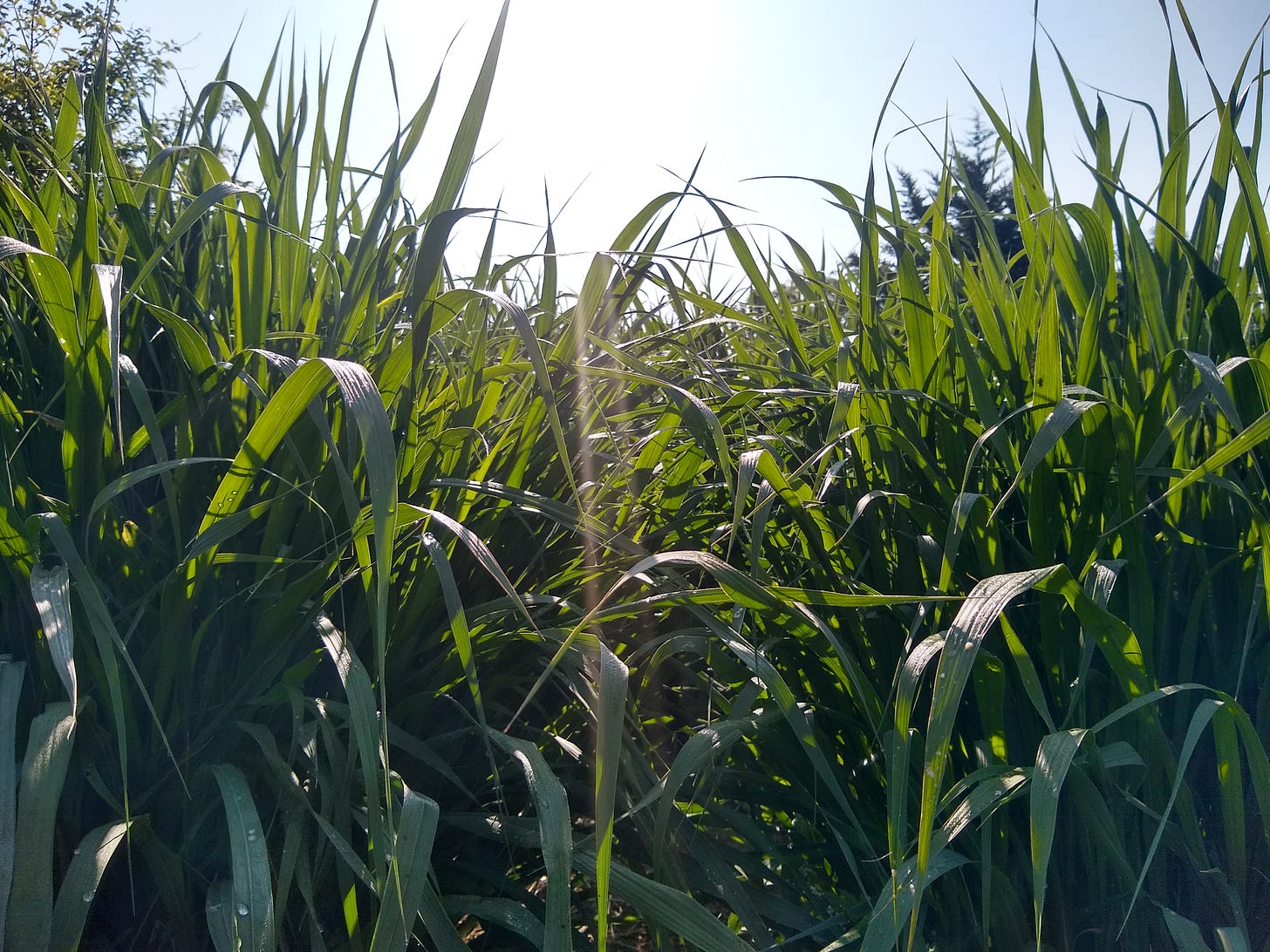Crepuscular Rhythms at Meteorological Summertime
The days are long and I spend my afternoons swatting flies and dreaming of rain
It is meteorological summertime. It seems like only a month or two ago that I was here extolling the virtues of slap-shotting frozen cowpies across the loafing yard, and now, six months or so since I began this writing project, the turds are still just as hard, petrified by the hot winds of an arid and unrelenting high pressure weather pattern sitting on top of us like some bariatric sow in the middle of the day.
Speaking of the middle of the day, that’s where I am now, and normally this would be close to naptime. The long days and summertime heat have once again driven me to a more crepuscular rhythm, spending the early morning scything and the evening time transplanting sweet potatoes and weeding the garden. The broad, bright centers of our days now include a siesta of sorts, though I do make sure to tend to the needs of my livestock deep in the hottest point of the afternoon, when they may require more water and attention. The swine, much like myself, spend the afternoon time sprawled in the shade, becoming more active when the sun is nearer the horizon.
Ragweed demonstrates crepuscular living.
In case you haven’t been following along, this spring has been exceedingly dry for us. How dry has it been? Well, it’s been so dry that the trees have been whistling for the dogs. I’ve been thinking of cutting back on the cow water and getting into the evaporated milk business. It’s been so dry, the Baptists are only offering a sprinkling anymore and the Methodists have taken to spitting if no damp towel is available. The Catholics are just issuing rain checks.
After my last edition of the almanac, a friend and teacher of mine offered the sensible suggestion that I get a pond dug nearer the areas where I need water the most. We’ve always had a plan to “puddle up” more, so that excess water in high moisture times can be reserved for months like this when little significant rainfall accumulates. Until such a time as we can work out an affordable cost share on one, we can pump from a further away pond using a complicated series of hoses, valves, solar panels and tanks, or rely on municipal county water, should the folks maintaining the reservoir choose to continue offering it to us. The advantages of this current system include always having something to do, and a convenient excuse to exit any conversation or meeting I find boring, annoying, or unsavory.
In fact, here’s a bonus template for folks at home: “I’m sorry/proud/so interested to hear about your niche complaint/hobby/political viewpoint, but I think I may be overfilling a water tank/need to move my hose/go flip several valves in different directions that only I would understand. If you want to tell me more, you’ll have to take a quarter mile walk with me in the blistering sun.” If you are plagued with an extra-helpful person, and this does happen from time to time, have them come along with you and ask them to provide suction on the end of a hose that draws from nowhere.
Eastern Gamma Grass fills in for that transition time between cool season and warm season grasses.
The dry weather has not negatively affected our fly population. In fact, flies are doing great, though ticks are down, and chiggers are holding steady. One day, it will probably rain a useful amount again, or, knowing the particular flavor of irony that God has reserved for Northeast Missouri, we’ll have moved on to a more biblical moisture scheme. No providence for me, just divine snark. And the day after that day comes, our tick population will explode, like it always seems to. Lucky for me, my blood is damned near dry, and they’ll find little purchase along my parched and tanned skin. (Note: a brief but forceful squall of rain struck just as I drafted this last paragraph.)
When the rain does fall, some will rest in the cup and cone shaped leaves of corn and squash, and some may slide down the cracks in the earth where it is needed, or soak into the thick grass mulch of our garden beds, and while I’ll probably have laundry on the line, I’ll still rejoice, if it lasts a good hour or so. The small bout of rain that just fell has already stopped as soon as I removed the row cover from off the sweet potato starts, but that’s farming. It was enough to stir up the flies, wake up the angry ants in the garden mulch, and get our old dog to emit that timeless wet canine bouquet.
Still, I have plenty to be thankful for. A healthy herd of ducklings is making its way onto pasture and learning from their mothers all the vital ways to be a duck, our peach tree is loaded with young, fuzzy fruit, little turkey poults are hatching as I write, the cows continue to give an abundance of creamy and decidedly wet milk, and a bounty of strawberries, mustard greens, lettuce and garlic scapes are pushing their way out of the garden and into our pantry. The mosquito population has been greatly diminished this year, and we have been able to expand grazing down into our bottomlands during a time of year when these areas would ordinarily be too wet to graze responsibly. The nights have been cool, even cold at times, and by way of a complicated schedule of timing the opening and shutting of windows in our humble earth-bermed straw bale home, we have been able to maintain a comfortable and quiet atmosphere for rest and shelter throughout the hot and sunny mid-day hours without the waste and expense of air-conditioning.
The early mornings are fine and cool. If I can be up at 4:45 or so, and have prepared my hot water for coffee ahead of time the night before in a vacuum-sealed thermos, I’ll have most of two hours to scythe meadow grass for garden mulch and pasture management, or spend time puttering in the garden before the kids need to be woken up and fed. The dawn lasts long this early in the season, sharply heralded by the cacophonous song of wild birds. It won’t be like this later in the summer, when the sun scorches early on and my two hours of serenity are whittled down to about a half hour, the air still and silent in the hot morning. The twilight too has its own charm, as we do the work we feel compelled to perform, setting the thin rooted and tender young seedling of peppers, melon, and sweet potatoes into the embrace of soil and mulch. Transitioning into June, we are moving into lightning bug season, or maybe you call them fireflies if you’re classier than me. As soon as the sun sinks too low to see our hands working anymore, we’ll walk back up the hill from our garden plots, past the snoring piles of pasture hogs and contentedly ruminating cattle and up through a constellation of bioluminescent night-flying beetles. Like everything pleasant, glowbugs are at risk due to a wide range of anthropogenic disturbances so enjoy it while it lasts.
Pliny the Elder advises us to harvest our barley and plant our millet once the familiar twinkle of the glow worm begins to blink in the evening sky, but this ain’t ancient Rome, even if our current cultural trajectory has a few similarities, so I’d modify Pliny’s suggestion to say get your cowpeas in. Cowpeas are always a good crop to start. They do well in extreme heat and drought but still seem largely unbothered in flood years, a resilient protein that comes through in the clutch, dries and processes well, and is easier for some to digest than more common phaseolus-type beans. When the air out there is drier than a popcorn fart, a legume that doesn’t rumble the tummy is a fine thing to behold.
May has been a stressful and absurdly busy month for us, and after all that work, when I look around I am more likely to see the things could have been done better, or should be done still. Not resting on our laurels, whatever the origin of that phrase may be, does not necessarily lead to a peaceful state of contentment, nor should it. This isn’t a wellness retreat, we get stuff done in this little project of ours, and if a two minute and thirty second firefly show across the arid, manure-ridden fields on my way up to a fitful night of sleep is the reward I get in June, it’s only because bigger and better things have been planted and are well on their way for harvest season. Deep rest will come, when the daylight again grows short and our larder is full of the material of our provisioning. Til then it’s toil, I s’pose. I can tell you all about it…
What’s that? You need to go move some hose around? Can I come with and help?
Crepuscularly yours,
BB





You described that morning period perfectly.